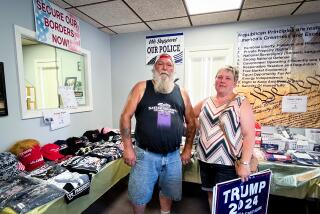U.S. Alleges Scam Targets the Homeless : Inquiry: Lawyer for operator of board and care homes denies accusation that she recruits victims and steals Social Security checks. No arrests have been made.
Operators of a network of two dozen unlicensed board and care homes in Los Angeles and Tulare counties have been running a grim skin trade in which elderly and disabled homeless people are recruited off Skid Row, kept in often substandard housing and fleeced of Social Security and disability checks, according to federal authorities.
More than 200 victims lost pension or subsistence money of $400 to $600 a month to scam operators, who were aided by two federal Social Security Administration employees, authorities say.
No arrests have been made or charges filed yet in what authorities describe as a six-month, ongoing investigation by federal, state and local officials.
Licensing officials believe that a homeless man found dead in Hancock Park last week was trying to escape from one of the facilities under investigation.
Victims tell of being forced to live in homes where they were allegedly abused, drugged, poorly fed and clothed and given little spending money from their checks, which were often sent directly to the facility operators.
“I’m outraged at finding out how these people are being treated,” said Leslie Walker, public affairs officer at the Social Security Administration, the federal agency investigating the alleged network.
“They think it’s going to be a better place than living in a shelter, and then they find out the living conditions are worse and they talk about feeling like being in prison and being afraid to leave the places,” Walker said.
Walker said she was embarrassed that two fellow employees, who have been put on administrative leave, are suspected as acting as insiders in the alleged scheme. Authorities refused to identify them.
Walker said the two employees were suspected of helping the home operators quickly change the recipients’ mailing addresses so that checks could be sent to the unlicensed facilities.
Home operators allegedly used a recruiter known only as “Big Man,” who stands 6 feet, 5 inches tall and weighs 300 pounds and who was paid $50 to $75 to find homeless people to live in the facilities.
In a complaint to authorities, one man said Big Man hit him with a branch when he tried to walk away from a wall where he had been instructed to wait for a ride to a home.
“The blow split my skin above my right eye, bled a lot and left a two-inch scar,” federal officials quoted the man as saying. “Big Man then said that he was sorry he had to hit me, but that I had to stay by the wall.”
At the center of the network, say federal officials, is a Granada Hills woman who uses three names, has extensive real estate holdings in California and transported some victims from Skid Row to her two unlicensed board and care homes in the little Tulare County town of Pixley, 140 miles north of Los Angeles.
Arta Savery, also known as Arta Palma and Arta Quiroz, owns the buildings in which some of the alleged network homes operate, federal authorities said.
Savery was convicted of four counts of operating unlicensed board and care homes in Pixley in 1990. She was fined $4,000 and put on probation for the misdemeanors.
“She’s well-known to Tulare County agencies,” said Diane Hawkes, supervisor of an Adult Protective Services office in the county.
Hawkes said residents of Savery’s homes have frequently walked to a county sheriff’s substation to complain about treatment and conditions.
“They say they’re not treated well, not fed well and don’t have any money,” Hawkes said.
Savery’s attorney, Ward Stringham of Tulare, blasted authorities for taking their complaints to the media instead of charging his client with a crime.
“Why don’t they file if they have something?” he asked.
Stringham said he was unaware of Savery ever transporting homeless people from Los Angeles to Pixley. He said she gives room and board--but not care that requires a license--at an affordable price to poor people who come to town.
Stringham said complaints of poor conditions are “relative. It would probably be poor compared to the Ritz.” He said he was “not aware” of any evidence to support the federal accusation that Savery is at the center of a network to exploit the homeless. “Grand conspiracies don’t happen in my real world,” he said.
State and local officials in Los Angeles began to inspect the alleged network facilities last week to determine if board and care was being provided without licenses. At the same time, police found the body of a 61-year-old resident of an unlicensed home in Hancock Park hanging by the seat of his pants from a fence near the facility. Authorities say he died of natural causes while hung up on the fence. State licensing officials believe the resident was trying to escape from the home, which federal authorities say is part of the network. Officials relocated three residents in need of care and supervision, but five others elected to stay in the home.
Later that day, state officials removed nine residents from another home on the federal list, a sparsely furnished facility in South-Central where alleged victims had been sleeping three to a room on cots rather than beds, officials said. One man had only the clothes on his back when he and nine others were relocated.
In the past, other Los Angeles board and care operations have been accused of exploiting the homeless. The alleged recruiter, Big Man, emerged in a case a year ago.
At that time, an unlicensed board and care operator known as Mary Dunning--also known as Nurse Mary--used Big Man to recruit the homeless and then moved them from house to house to avoid authorities, according to the Los Angeles city attorney’s office.
“She was literally pocketing the entire checks and giving them 20 bucks for a month,” said Don Kass, supervising deputy city attorney.
Kass said Dunning posed as a nurse. Her operation was finally shut down when L.A. County Adult Protective Services workers found 13 mentally ill and elderly residents locked in a house on West Vernon Avenue. The windows were nailed shut, said Kass, and the residents were sleeping on cots or small spring beds.
Dunning was convicted of two counts of operating a board and care home without a license, fined $4,000, sentenced to 300 hours of community service and placed on unsupervised probation.
During an interview with The Times, Dunning denied posing as a nurse and exploiting, mistreating or locking up the homeless.
“I am very much into the homeless, but it’s because I care,” she said. “It’s not about a dollar or a check.
“My God in heaven knows,” she continued, “that I was doing what I was doing to help these people from my heart.”
Dunning says she is forming a nonprofit organization and hopes to get federal money to provide housing for the homeless.
More to Read
Sign up for Essential California
The most important California stories and recommendations in your inbox every morning.
You may occasionally receive promotional content from the Los Angeles Times.






